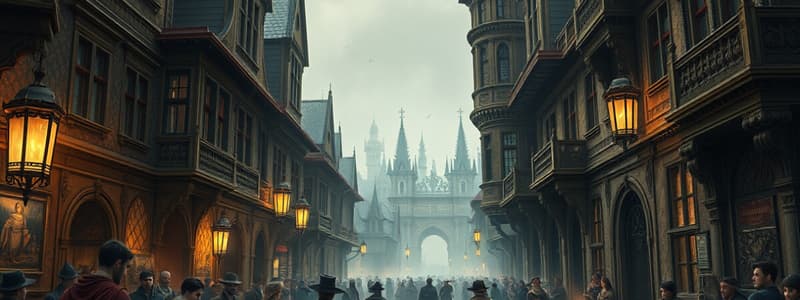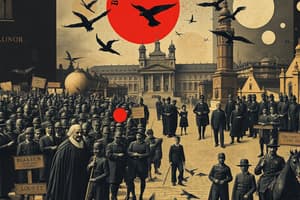Podcast
Questions and Answers
What was the Black Death primarily caused by?
What was the Black Death primarily caused by?
- Cholera
- Bubonic plague (correct)
- Malaria
- Influenza
What were pogroms?
What were pogroms?
Massacres against the Jewish minority in Germany.
What is scutage?
What is scutage?
Money paid instead of military service.
What does the third estate represent?
What does the third estate represent?
Who were condottieri?
Who were condottieri?
What triggered the Great Schism?
What triggered the Great Schism?
What is conciliarism?
What is conciliarism?
What does mysticism refer to?
What does mysticism refer to?
What is modern devotion?
What is modern devotion?
What does renaissance mean?
What does renaissance mean?
What are the three estates of society?
What are the three estates of society?
What does individualism emphasize?
What does individualism emphasize?
What is secularism?
What is secularism?
What is humanism?
What is humanism?
What is civic humanism?
What is civic humanism?
What is neoplatonism?
What is neoplatonism?
What is hermeticism?
What is hermeticism?
What does pantheism espouse?
What does pantheism espouse?
What were new monarchies?
What were new monarchies?
What is nepotism?
What is nepotism?
What was the 100 Years War?
What was the 100 Years War?
What were the chief factors leading to urban and rural revolts in the 14th century?
What were the chief factors leading to urban and rural revolts in the 14th century?
What were the causes and results of the Hundred Years War?
What were the causes and results of the Hundred Years War?
What impact did the Black Death have on European society and economy?
What impact did the Black Death have on European society and economy?
What major problems did European states face in the 14th century?
What major problems did European states face in the 14th century?
How did the authority and prestige of the papacy decline in the 14th century?
How did the authority and prestige of the papacy decline in the 14th century?
What were the major developments in art and literature in the 14th century?
What were the major developments in art and literature in the 14th century?
How did the adversities of the 14th century affect urban life and medical practices?
How did the adversities of the 14th century affect urban life and medical practices?
Flashcards are hidden until you start studying
Study Notes
Black Death
- Mid 14th century pestilence impacted Asia, North Africa, and Europe, primarily the bubonic plague.
- Bacteria Yersinia Pestis spread via fleas on black rats.
Pogroms
- Massacres against Jewish communities in Germany by 1351 resulted in the extermination of over sixty major communities.
- Many Jews fled to Eastern Europe (especially Poland) where they found refuge.
Scutage
- Money payments substituting for military service became common after the Black Death.
- Monarchs preferred this as they could hire dependable professional soldiers.
Third Estate
- Comprising 98% of the population, primarily peasants with limited legal rights.
- Minorities included some practicing doctors and lawyers.
Condottieri
- Mercenary leaders hired by Italian city-states during the Renaissance.
- Prominent figure: Sir John Hawkwood, previously fought in the Hundred Years War.
Great Schism
- Following Pope Gregory XI's death, Urban VI became pope but faced opposition from cardinals.
- Resulted in two legitimate popes (Urban VI and Clement VII), dividing Western Christians and weakening the Church's authority.
Conciliarism
- Emerged from the Great Schism, emphasizing the need for a general council to reform the Church.
Mysticism
- Characterized by an immediate experience of oneness with God, as taught by Meister Eckhart.
- Related to historical Christian claims of mystical experiences.
Modern Devotion
- Movement initiated by Gerard Groote contrasting with traditional Roman Catholic teachings.
- Emphasized simplicity in piety and morality, based on scripture.
Renaissance
- Term means "rebirth," with Italy viewed as the cradle of the modern era.
Estates
- Society in the Renaissance divided into three estates: clergy, nobility, and peasants.
Individualism
- The Renaissance celebrated personality, uniqueness, and individual capabilities.
Secularism
- A focus on materialism and worldly matters rather than spiritual concerns.
Humanism
- Intellectual movement centered on classical literature of Greece and Rome, emphasizing grammar, rhetoric, and ethics.
Civic Humanism
- In Florence, humanism merged with civic pride, giving rise to civil humanism.
Neoplatonism
- Sought to harmonize Christian teachings with ancient Greek philosophy.
Hermeticism
- Florentine movement emphasizing the occult sciences, including astrology and alchemy.
Pantheism
- Some Hermetic texts promoted Pantheism, seeing divinity in nature and celestial bodies.
New Monarchies
- 15th-century efforts to centralize power in monarchies, particularly in France, England, and Spain.
Nepotism
- The practice of favoring relatives in job appointments, common among popes due to lack of hereditary monarchy.
Hundred Years War
- Conflict (1337-1453) primarily between England and France, significantly damaging French countryside.
Urban and Rural Revolts (14th Century)
- Rural revolts driven by resentment toward noble landowners and royal policies.
- Urban revolts stemmed from poor wages, high taxes, and lack of representation.
Causes and Consequences of the Hundred Years War
- Causes included disputes over royal succession and territorial claims.
- Consequences: weakened England's continental power and strengthened the Valois monarchy in France.
Impact of the Black Death on Society and Economy
- Resulted in increased labor prices and decreased agricultural prices, leading to peasant mobility and class tensions.
- Triggered significant revolts, including the Jacquerie.
Major Problems Facing European States in the 14th Century
- Faced famine, plague, economic hardship, social unrest, and political instability.
- Conflict over territories led to the Hundred Years' War and increased corruption within nobility.
Decline of Papal Authority and Prestige
- Power struggles between popes and monarchies contributed to papal decline, culminating in the Great Schism.
- Resulted in a fragmented Church, prompting calls for reform and greater stability.
Developments in Art and Literature in the 14th Century
- Vernacular literature flourished with authors like Dante and Petrarch.
- Artistic themes shifted post-Black Death towards darker motifs, exemplified by artists such as Giotto.
Urban Life and Medical Practices in the 14th Century
- Efforts to combat the plague led to improved sanitation and changes in social roles.
- Increased focus on medical education and the significance of surgeons despite continued challenges posed by the plague.
Studying That Suits You
Use AI to generate personalized quizzes and flashcards to suit your learning preferences.




